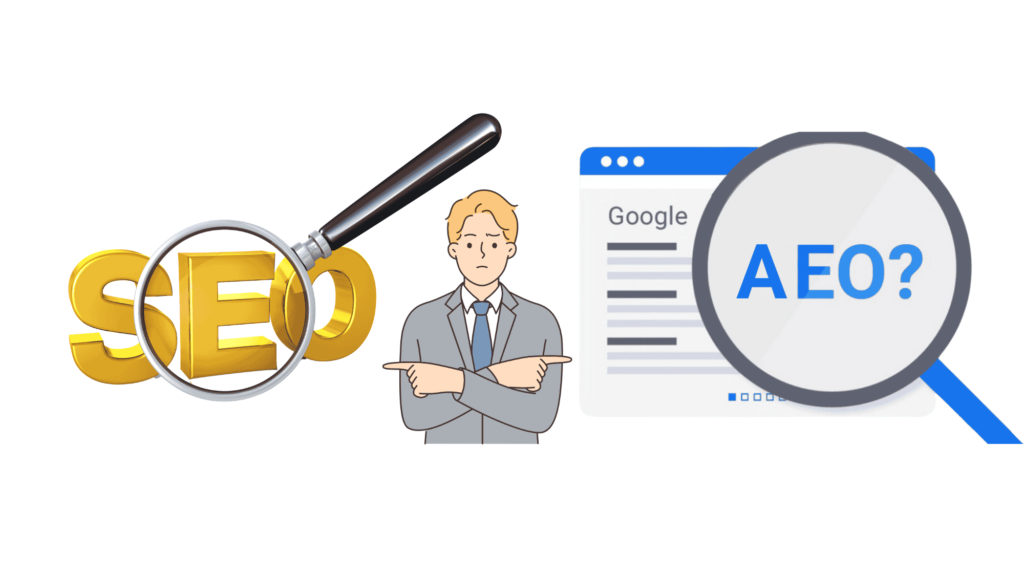What Is Answer Engine Optimization and Why Do Brands Need It?
Answer Engine Optimization (AEO) is the practice of optimizing digital content to be selected, cited, and referenced by AI-powered answer engines like ChatGPT, Perplexity, Claude, and Google’s AI Overviews. Unlike traditional SEO that focuses on ranking in search results, AEO ensures brands appear directly within AI-generated responses.
AI-powered answer engines and large language models (LLMs) have fundamentally changed how users discover information. Instead of clicking through search results, users now receive instant, conversational answers synthesized from multiple sources. These generative engines select and cite brands based on content structure, authority signals, and AI readability—not traditional ranking factors alone.
Brands that ignore this shift risk invisibility in the fastest-growing discovery channel. When an LLM cites a competitor but not your brand, you lose awareness, credibility, and potential customers at the exact moment they’re seeking solutions. Brand citations in AI responses function as powerful trust signals that influence purchasing decisions before users ever visit a website.
The stakes are particularly high because AI-driven traffic grows exponentially while traditional search traffic plateaus. To stay visible and competitive, brands need a specialist AEO agency that can craft strategies ensuring content is structured, authoritative, and optimized for how generative engines evaluate and select sources. This is where leading AEO experts provide critical guidance—helping brands earn visibility, trust, and citations within AI-generated results.
How Do Leading AEO Agencies Operate?
What core functions define top AEO agency services?
Leading AEO agencies focus on three primary pillars:
- Technical optimization for AI indexability
- Entity-based content strategies
- Continuous citation monitoring
These agencies deploy specialized teams that understand how generative engines parse, evaluate, and select information for AI-generated responses. They implement advanced schema markup and structured data frameworks that make brand information instantly readable to LLMs like ChatGPT, Claude, and Perplexity.
How do agencies tailor generative engine optimization strategies for AI ranking?
Top agencies conduct deep semantic audits to identify how AI models currently perceive a brand’s digital footprint. They restructure content around entity relationships and knowledge graphs rather than traditional keyword targeting. This involves creating question-cluster content that directly addresses queries AI systems commonly field, while embedding trust signals such as author credentials, citations from authoritative sources, and verified business information that LLMs prioritize when selecting references.
What role does integration play in effective AI content strategies?
Elite agencies merge SEO fundamentals with paid media amplification and marketing automation to create a unified presence across both human and AI audiences. They optimize content simultaneously for traditional search visibility and AI citation potential, ensuring brands appear in Google’s AI Overviews while maintaining strong organic rankings. Proprietary dashboards track brand mentions across multiple generative platforms, providing real-time insights into citation frequency and context that conventional analytics tools cannot capture.
What Are The Key Factors That Generative Engines Use To Rank Brands in AI-Generated Answers?
Generative engines prioritize brands based on authority signals, content clarity, and structured information architecture. AI models scan for entities that demonstrate expertise through consistent citations, verified data, and semantic relationships between concepts. Brands appearing frequently across authoritative sources with clear entity definitions gain preferential treatment in AI-generated responses.
Entity Optimization
Entity optimization forms the foundation of generative engine ranking factors. AI systems identify brands as distinct entities when content explicitly defines what the company does, who it serves, and how it relates to industry topics. This requires implementing comprehensive entity markup that connects brand mentions to relevant concepts, products, and industry verticals through semantic content linking.
Structured Data and Schema Markup
Structured data and schema markup act as direct communication channels with AI models. Generative engines parse schema.org vocabulary to understand:
- Organization details including founding information, leadership, and business categories
- Product specifications with pricing, features, and use cases
- Article relationships linking content pieces through topical clusters
- Review aggregates demonstrating social proof and credibility
Semantic Content Linking
The depth of semantic content linking determines how AI models contextualize brand relevance. When content connects related concepts through internal linking, co-citations, and topical clustering, generative engines recognize the brand as a knowledge hub. This interconnected content structure helps AI understand not just what a brand offers, but why it matters within specific query contexts.
What Techniques Do Agencies Use To Ensure Brands Are Cited By AI Models?
Leading agencies deploy brand citation strategies that combine technical precision with authority-building tactics. These methods target how AI models evaluate and select sources for their generated responses.
1. Technical SEO enhancements for AI indexability
Technical SEO enhancements for AI indexability form the foundation of citation success. Agencies implement advanced schema markup beyond basic structured data, including Organization, Product, Article, and FAQ schemas that explicitly define brand entities and their relationships. They optimize site architecture for AI crawlers, ensuring clean HTML, fast load times, and mobile-first design. XML sitemaps are refined to prioritize high-value content that answers common queries in the brand’s domain.
2. Building brand authority through trust signals recognized by LLMs
Building brand authority through trust signals recognized by LLMs requires a multi-faceted approach:
- Securing high-quality backlinks from authoritative domains that AI models already trust
- Creating comprehensive author profiles with verified credentials and expertise markers
- Publishing original research, data studies, and thought leadership content
- Maintaining consistent NAP (Name, Address, Phone) information across digital properties
- Earning mentions in reputable industry publications and news sources
3. Monitoring brand citations across multiple generative platforms
Monitoring brand citations across multiple generative platforms involves proprietary tracking systems that query AI models systematically. Agencies test hundreds of relevant prompts across ChatGPT, Perplexity, Claude, and Google’s AI Overviews, documenting when and how brands appear. This data reveals citation patterns and identifies optimization opportunities that traditional analytics tools cannot capture.

Which Industries Benefit Most From Specialized AEO Services?
B2B SaaS
B2B SaaS companies gain significant advantages from industry-specific AEO services because AI models frequently answer queries about software comparisons, feature sets, and integration capabilities. When prospects ask ChatGPT or Perplexity “What’s the best CRM for small businesses?” or “How does project management software integrate with Slack?”, brands optimized for these queries appear in direct answers rather than requiring users to click through multiple search results.
Fintech and Financial Services
Fintech and financial services require specialized AEO approaches due to strict regulatory requirements and the need to establish credibility. AI models prioritize authoritative sources when answering money-related questions, making trust signals and compliance documentation critical for citation success.
Healthcare and Pharmaceutical
Healthcare and pharmaceutical brands face unique challenges with medical accuracy standards and HIPAA considerations. Leading agencies structure content to meet both regulatory requirements and AI readability standards, ensuring medical information appears in generative responses while maintaining compliance.
Legal Services
Legal services benefit from B2B SaaS AEO techniques adapted for complex legal terminology and jurisdiction-specific content. Law firms need entity optimization that helps AI understand practice areas, case types, and geographic service regions.
Luxury Goods
Luxury goods brands require different strategies focused on brand storytelling and product differentiation. Agencies customize solutions to emphasize heritage, craftsmanship, and exclusivity—attributes AI models recognize when answering aspirational purchase queries.
Regulated industries demand agencies with deep vertical expertise who understand compliance frameworks while implementing technical optimizations that satisfy both legal teams and AI algorithms.
How Does AEO Differ From Traditional SEO Practices?
What makes AEO fundamentally different from traditional SEO? The main difference is in the end goal: traditional SEO optimizes for clicks through search engine results pages, while AEO targets direct citations within AI-generated answers. When a brand appears in a ChatGPT response or Google AI Overview, users receive information without clicking through to a website—a significant change that redefines success metrics.
The SEO vs AEO differences become clear when looking at how they measure success. Traditional SEO uses established metrics like click-through rates, bounce rates, and page rankings tracked through Google Analytics and Search Console. AEO operates in a measurement gray area where standard analytics tools cannot capture when AI models mention your brand in their responses. Agencies must use specialized monitoring systems to track citations across platforms like Perplexity, Claude, and ChatGPT.
The way people discover content is another important difference. Traditional SEO focuses on ranking for specific keywords in a list of blue links. AEO prepares content for conversational queries where users ask complete questions expecting comprehensive answers. AI engines gather information from multiple sources, giving priority to content with:
- Clear relationships between entities and semantic connections
- Authoritative trust signals recognized by language models
- Structured data that AI can read and understand
- Direct answers to natural language questions
This shift requires content to be structured in a way that AI can understand rather than human readers who are scanning search results. The transition from traditional SEO to AEO signifies a profound change in digital marketing strategies, emphasizing the need for businesses to adapt and evolve with the changing landscape of search engine technology.
Why Is Securing Authoritative Citations Critical For Brand Visibility Today?
When AI models cite your brand, they position you as a trusted authority in your field. These authoritative AI citations function differently from traditional backlinks—they appear directly within conversational responses that millions of users see daily, creating immediate brand recognition without requiring a click-through.
The impact on brand awareness compounds rapidly. A single citation in ChatGPT or Perplexity can reach thousands of users within hours, with each mention reinforcing your brand’s expertise. Users trust AI-generated recommendations at rates comparable to personal referrals, making these citations more valuable than traditional advertising placements.
AI-driven traffic channels are experiencing exponential growth:
- ChatGPT surpassed 100 million weekly active users in 2024
- Perplexity handles over 500 million queries monthly
- Google’s AI Overviews now appear in 15% of all searches
Brands that secure early positioning in these channels establish a citation advantage that becomes harder for competitors to displace. Inside a leading AEO agency: how generative engines rank and cite brands reveals that AI models develop “memory patterns” around frequently cited sources, creating a self-reinforcing cycle of visibility. Click here to get more about using AI tools in your studies.
The long-term value extends beyond immediate traffic. Early adopters build comprehensive entity profiles that AI systems reference repeatedly, creating sustained visibility across multiple platforms and query types without ongoing paid investment.

What Does The Future Hold For AEO Agencies And Brands Looking To Thrive In The Age Of Generative Search?
The future of AEO agencies centers on adapting to an increasingly AI-mediated discovery landscape where traditional search becomes just one channel among many. Brands will interact with consumers through conversational interfaces, voice assistants, and embedded AI tools that prioritize cited sources over clickable links.
Digital discovery is shifting from keyword-based queries to natural language conversations with AI models. Users ask complex questions and receive synthesized answers rather than scrolling through blue links. This transformation means brands must position themselves as authoritative sources that generative engines trust and reference automatically.
Inside a leading AEO agency: how generative engines rank and cite brands reveals that early adopters gain compounding advantages. As AI models learn which sources provide reliable information, they develop citation patterns that favor established authorities. Brands entering this space now build recognition before markets become saturated.
Specialized AEO services offer strategic advantages:
- Proprietary monitoring tools track brand mentions across multiple AI platforms
- Entity optimization frameworks ensure consistent brand recognition
- Semantic content architectures align with how LLMs process information
- Trust signal development builds authority AI models recognize
Brands delaying investment risk invisibility as competitors secure citation dominance. The agencies leading this transformation combine technical expertise with strategic foresight, helping clients navigate the transition from search engine optimization to answer engine prominence.
More to Rea : From SEO to AEO to GEO: The Evolution of Search Optimisation in 2025

